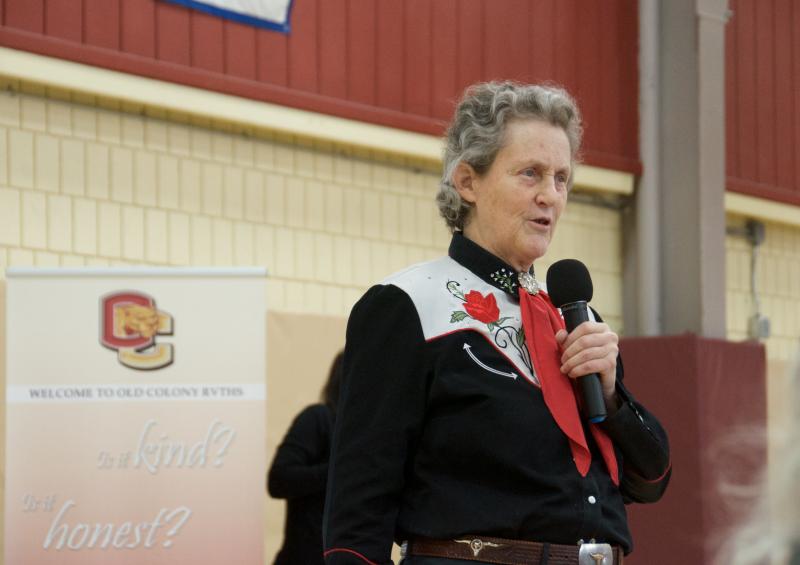Temple Grandin: 'The world needs all kinds of minds'
Dr. Temple Grandin’s message is simple: We need to embrace those who think differently, and if those people are playing video games in the basement, then it’s time to bring them up to ground level.
Grandin is well-known for her accomplishments as an industrial designer in the livestock industry, her autism advocacy and her straightforward manner. Plus, Claire Danes played her in an eponymous, feature length biopic. No biggie.
“Pretty good for someone they thought was mentally retarded,” said the Colorado State University professor.
On Saturday, Grandin visited Old Colony Regional Vocational Technical High School where she spoke about engaging students with autism, something she understands firsthand.
Nonverbal until age four, Grandin said she is a “bottom up,” visual thinker who, like others on the autism spectrum, needed personal attention to learn things that come easy to the “top down” thinker. Hands-on, interactive learning was key.
As a kid, her mother read to her and she was forced to interact through jobs around the neighborhood, including painting signs for the county fair and working with cows.
“That taught me important work skills,” Grandin said. “I’m seeing kids graduate from high school and college who’ve never learned how to work. This is bad for the normal kids, but it’s disastrous for kids who have any kind of a learning problem.”
Succeeding also required some back door opportunities. As a visual thinker, Grandin said she was awful at algebra, which, fortunately wasn’t required at her college in the 1960s. Still, she barely squeaked in. Due to her grades, she was on probation from day one, but Grandin succeeded because she got personal attention and wasn’t put in a special class.
In today’s world, however, labeling can prevent schools from realizing the potential autistic children have, said Grandin.
“Chuck them out of the special education box,” she said. “You’re putting the same label on somebody who can’t dress themselves as somebody who can design the iPhone. That doesn’t make very much sense.”
She cited examples of successful thinkers who didn’t start out on steady footing. For example, Albert Einstein didn’t talk until he was 3, naturalist Jane Goodall was a “hyperactive, addled high school dropout” with a two-year secretarial degree, and Stephen Spielberg had dyslexia, was bullied and couldn’t get into a top film school.
“All of these people did not go on the conventional educational path,” she said.
And all of them had hands-on learning opportunities, which are being cut from schools, a problem Grandin mentioned throughout her lecture.
Another problem: Visual thinkers are easily sucked into video games.
“I’m worried that lots of our visual thinkers are ending up in the basement,” said Grandin. “If he ends up in the basement playing video games, I don’t care if he’s an honor student. It doesn’t matter. He’s not contributing to society.”
She encouraged the audience, many of them educators and parents, to think creatively, to engage learners with special needs and to help them find careers they will love.
“The world needs all kinds of minds,” she said.
Old Colony Superintendent Aaron Polansky was instrumental in Grandin's visit and said her points fit in with the school's goals.
“We want our students to love what they do, we want them to connect, we want them to create,” he said. “They are a name and they are not a number. We're preparing them for life not for a test.”














